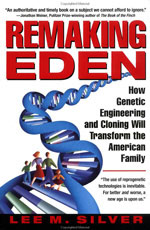|
published by Ecco/Harper Collins, 2006
|
|
Challenging Nature
Previous books
Presentations
Publications/Writings
Biography
Princeton teaching
|
Brave New World Dawning
Since 1978, reproductive
biologists have helped couples overcome infertility by using increasingly
sophisticated techniques for generating and manipulating human embryos in
the laboratory. At the same time, molecular biologists have been working
to overcome human disease by deciphering the entire sequence of the human
genome and constructing tools to correct genetic and cellular defects. While
reproductive and molecular biologists focus on unrelated medical problems
- infertility and disease - combining their technologies produces reprogenetics,
which will allow us to design ourselves.
Reprogenetics will enable prospective parents to give their children genes
that they themselves do not carry, thereby increasing their offspring's
chances for health, longevity, happiness, and success - an appalling prospect
for many bioethicists. But is reprogenetics simply a new and more powerful
vehicle to repeat the abhorrent eugenic practices of the past? Or are reprogenetics
and eugenics fundamentally different from one another in terms of both
control and purpose?
Eugenics embodies the desire and attempts of a society's leaders to control
the breeding practices of its citizens, including the forcible sterilization
or murder of those deemed as carrying undesirable genes. Reprogenetics,
by contrast, is concerned with the question of what genes an individual
child will receive, not with the vague, unscientific goal of improving
a society's gene pool. Moreover, it gives control to individual prospective
parents. While eugenic practices led to a restriction of reproductive freedom
and worse, reprogenetics can do the opposite. It could help parents have
children with a higher likelihood of being healthy, without bringing direct
harm to anyone else.
Reprogenetics can be understood as an extension of parents' fundamental
motivation and desire: to protect their children and give them all possible
advantages in life. Parents in affluent societies already provide environmental
advantages to their children after birth; reprogenetics could allow them
to pursue the same objectives before birth.
Of course, neither environmental nor genetic advantages guarantee healthier,
happy, successful children. But the lack of guarantees does not prevent
parents from spending $140,000 to send their children to the elite private
university where I teach. If democratic societies allow people to spend
money to buy environmental advantages for children, how can they prohibit
parents from buying genetic advantages? If reprogenetics is used to increase
chances of health, happiness and success, what could be wrong with it?
Once issues of technical safety are resolved, a fundamental objection
to reprogenetics is its inherent unfairness to families unable to afford
it. All modern democratic societies must balance individual autonomy and
social justice. In the US, individual autonomy is of paramount importance.
In most other Western countries, social solidarity looms much larger.
Most European countries try to realize it by providing equal healthcare
and educational opportunities to all children. But the argument that genetic
enhancements are immoral because not all children can receive them is flawed.
Children are not biologically equivalent to begin with. Everyone is born
with advantages or disadvantages across a whole range of physical characteristics
as well as innate abilities. Life is not fair.
So, in the future the critical question will be this: "Who decides
how genetic advantages are distributed?" Who decides which child will
get the HIV resistance gene and who will be born susceptible to AIDS? Who
will decide which child will have superior protection against cancer and
heart disease?
Should the decision be left to the randomness of nature, as it is now?
Should it be determined by the parents' affluence? Or should it be controlled
by a benevolent state that doles out life-enhancing genes to all its newly
conceived children?
Unfortunately, provision and regulation of genetic enhancement technology
will not be easy. Unlike healthcare, there are almost no limits to genetic
enhancements. There can always be stronger resistance to disease, greater
longevity, more physical prowess, and higher mental capacity. Furthermore,
the innate desire to provide for one's children is so powerful that affluent
citizens may buy reprogenetics elsewhere even if their society bans or
limits its use. Today, for example, Europeans travel to the US to purchase
human eggs from young women chosen on the basis of their presumed genetic
characteristics.
It is, however, possible to envisage an alternative scenario to that of
a growing gap between "haves" and "have-nots." Although
such a gap may emerge initially, the cost of reprogenetics is likely to
drop sharply over time. Like computers and advanced telecommunications,
it could become affordable to the majority in developed countries.
Ultimately, hyper-human genetic enhancements will become feasible, too,
and the economic and social advantages that wealthy countries maintain
could be expanded into a genetic advantage. The divide between wealthy
and poor nations could widen further with each generation until a common
humankind no longer exists. A severed humanity could be the ultimate legacy
of unfettered global capitalism.
The only alternative to this bleak possibility seems remote today and
may never be viable: a single global state in which all children are provided
with the same genetic enhancements and the same opportunities for health,
happiness, and success. While this sounds like political fiction in a world
where children still die from starvation, reprogenetics sounded like science
fiction only thirty years ago. The course of political development is,
for good or bad, far more difficult to predict.
|
Hover over or click on books to order from Amazon.com
|



